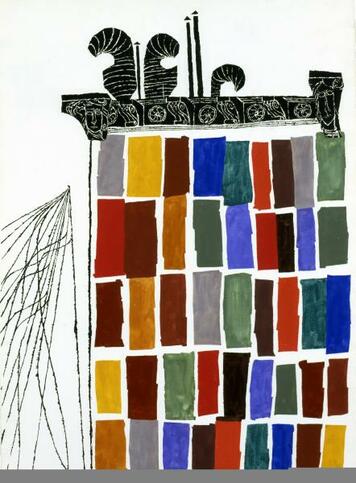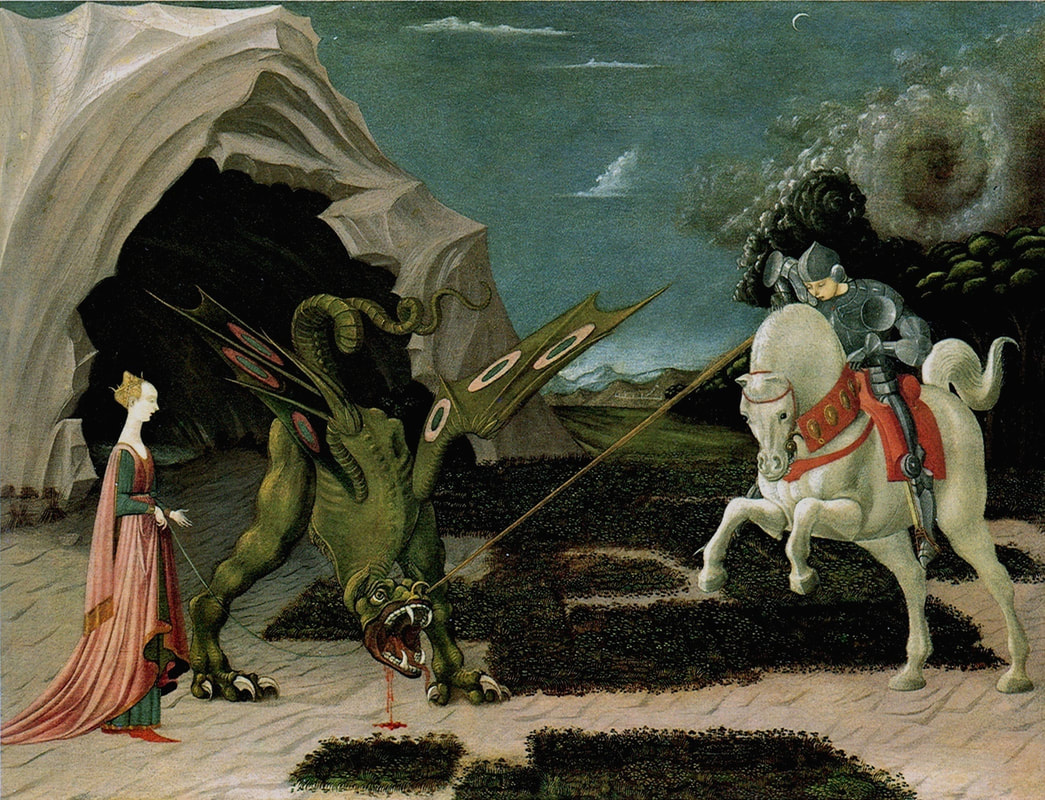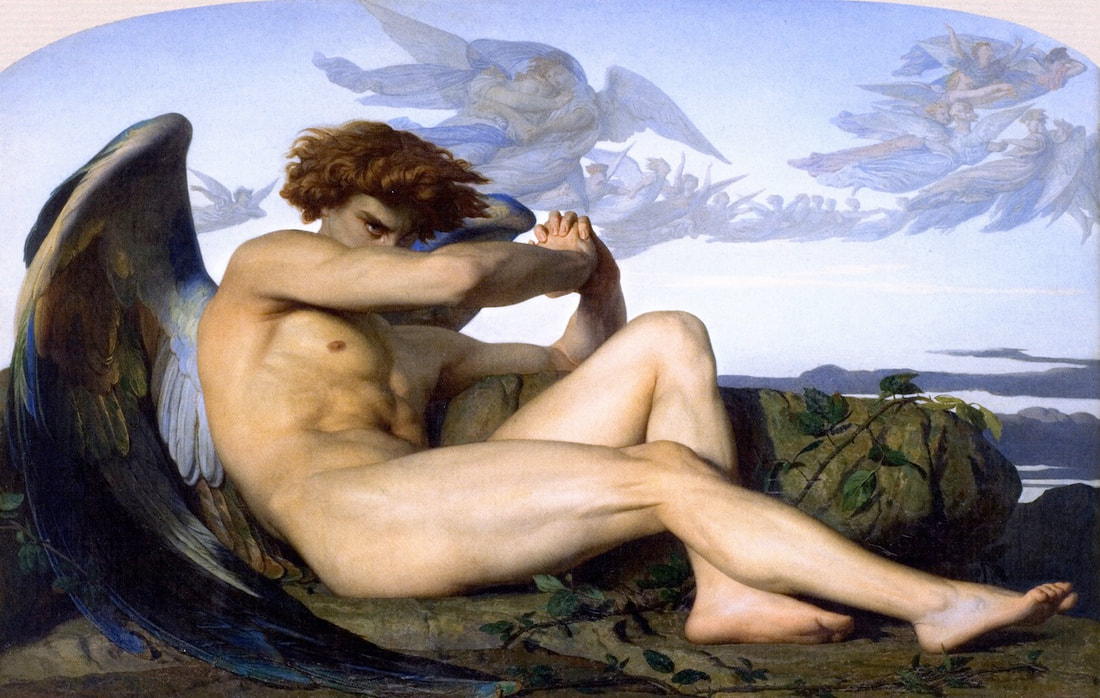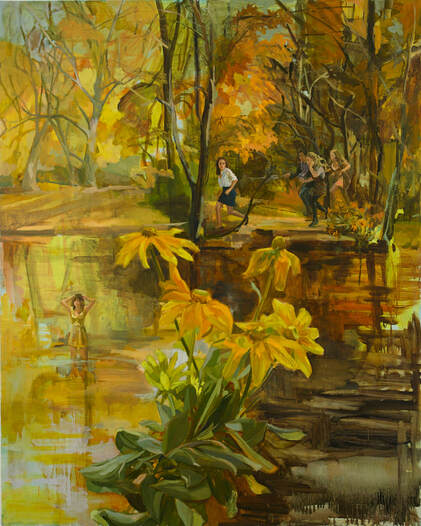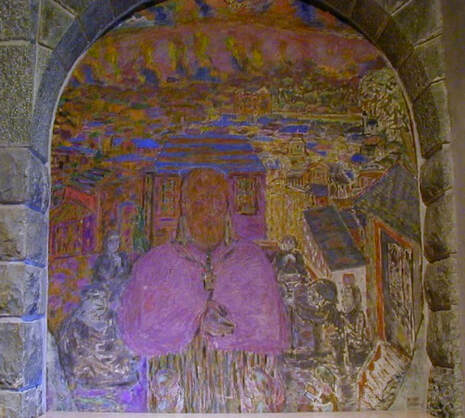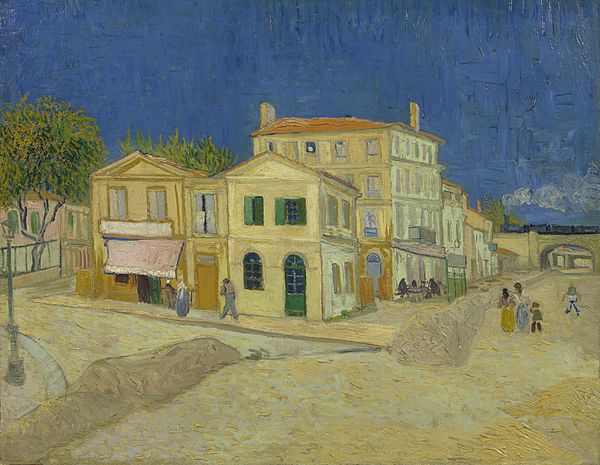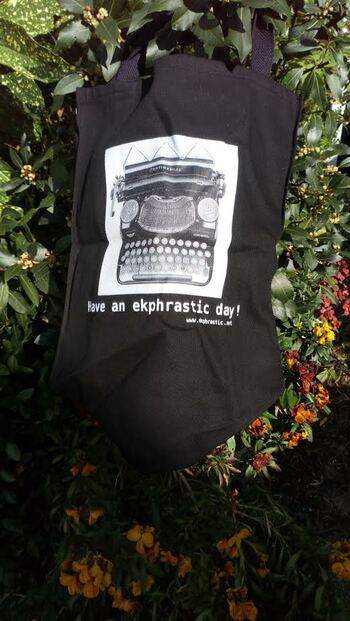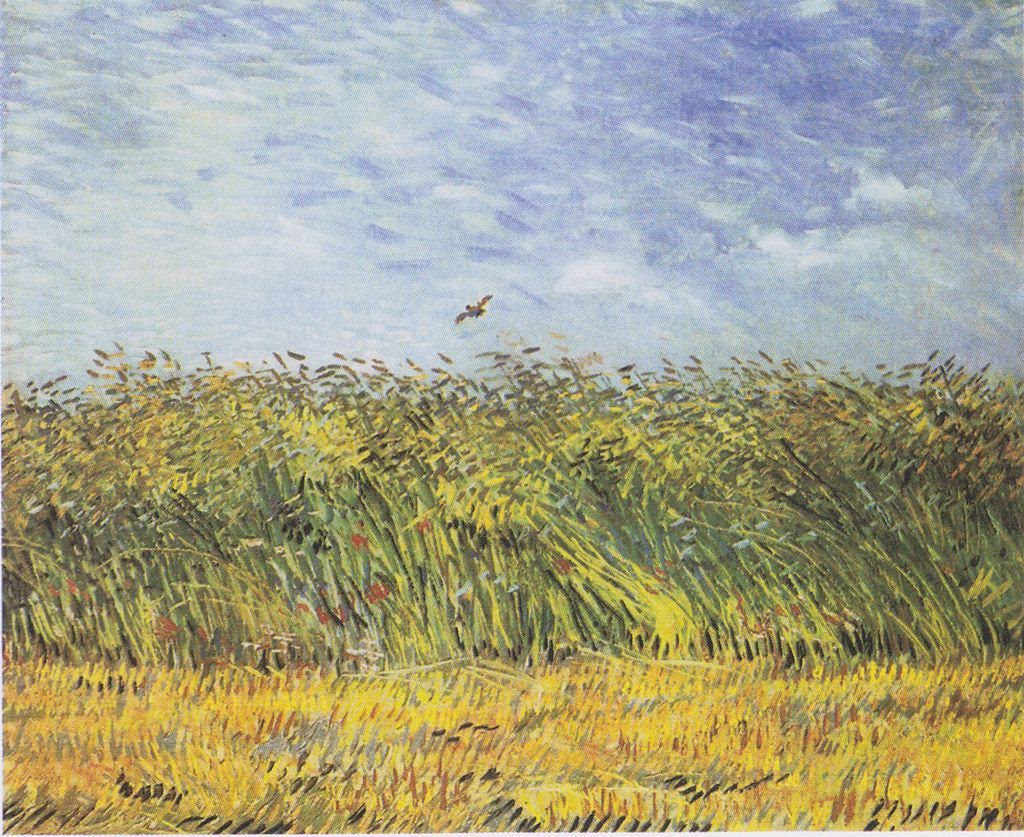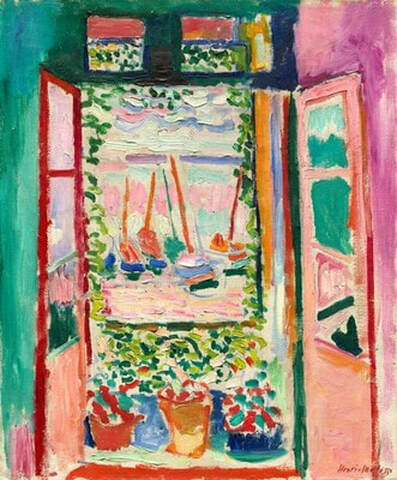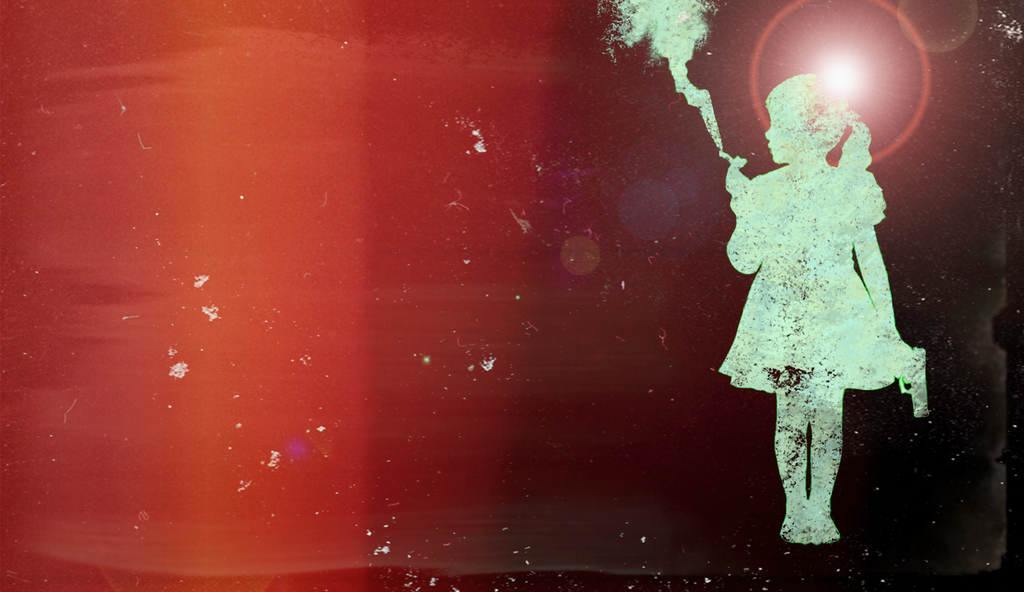|
Ben Shahn’s Paterson: Behind the Factory Windows The first time I saw Paterson, one of a number of works of the same name produced by Ben Shahn in the 1940s and 50s, the print seemed almost too straightforward. The museum placard said that Paterson, New Jersey, was once known as Silk City, and the dozens of harmoniously coloured and rhythmically placed almost-rectangles, arranged within the partial outline of a building, represented silk swatches hanging in factory windows. Shahn was said to be fascinated by “dye-patterns” he saw when he visited the city, and there didn’t seem to be much else to puzzle out. But the abstraction and narrow focus of the print surprised me. I had thought of Shahn as a social realist, and his work, as I had previously encountered it, was about human activity and fighting injustice. Later I learned that Shahn, though he was dedicated to meaningful content in art, also “stood somewhere between the abstract and what is called figurative” (Ben Shahn, by Bernarda Bryson Shahn) and resisted the label of social realism. His stance proved, at least in terms of the effect this work had on me, to be surprisingly powerful. And as a result of that first encounter with Paterson, and more recently mulling over it in collections of Shahn’s graphic works, I was inspired by its subtle details to learn and remember. The outline of the factory building in Paterson affirms the ancient origins of silk. One source described the building as having “a Grecian-style façade”; and the cornice decorated with faces and medallions and the flat roof with variously shaped vents and stacks, though somewhat fancifully portrayed, call to mind older ways of making things. Of course, silk was around long before Paterson became Silk City, and Mary Schoeser calls it "one of a handful of commodities that have shaped world history.” The process of raising silkworms and turning their cocoons into raw silk began in China more than five thousand years ago. Later on, silk was traded along the mythically famous Silk Road; was used to back paper currency during the rule of Kublai Khan (1260-1294); and because it was so valuable, families and communities cooperated to raise silkworms and spin their silk. This was true over many hundreds of years in rural China, Japan, India, and elsewhere. The spindling, spidery tracks to the left of the factory in Paterson call to mind the wealth silk once brought the city. By the early 20th century, not only was the United States the world's largest producer of silk cloth, but Paterson was the epicentre of this colourful output. Tracks were needed for the silk trains loaded with raw silk shipped from China or Japan; under armed guard they rushed from the west coast to the east to places like Paterson. The silk was insured, worth as much as gold bullion, and one time the king of England was sidelined while the silk rushed by. The blocks of colour in the factory windows in Paterson make us wonder what has gone on behind them. Their appearance is somewhat mysterious, and I haven’t learned exactly what “dye-patterns” were. But I do know that Shahn’s Paterson was also inspired by an epic poem of the same name by William Carlos Williams. Celebrating invention, the poet says, “…unless there is a new mind there cannot be a new line.” Yet when Shahn gave Williams a somewhat different version of Paterson in 1957, Williams is said to have found the work too abstract. “I'd like to have seen a big figure of a mill-worker applied all over the surface of it with the windows showing through,” he said. Williams himself only mentions silk and strikes and labour disputes a handful of times in his poem, but both men surely knew that in the days when silk was king the workers were worked hard by the factory owners. How would new minds respond to enterprises that ruthlessly exploited immigrants and children? I.W.W. organizers, at least, responded by helping workers oppose long days and low pay. But though a 1913 strike went on for over six months, the mill owners broke it and things went back to the way they were. Well, not entirely. Because between 1881 and 1900 there had already been over 130 strikes in Paterson. And even before 1913, companies had begun to move their operations over to the next state – Pennsylvania – which wasn't so well unionized or so stringent about child labor laws. That was where my grandmother became a silk mill worker in 1910. I remember her voice, sounding plaintive and aggrieved, as she told me her family made her quit school to go work in the mill. She was twelve years old. She said it was hard work and she didn’t get enough to eat. She said the silk dust hurt her eyes. She said she wanted to be in school. Sometimes, sitting in my own classroom, I would think about what it might be like, standing in the service of a machine, watching the slick silk thread, expected to mend it pronto if it snapped. But though Mother Jones, the famous organizer, had led a march of child workers in Pennsylvania in 1903, grade-school-age children continued to work in the mills for decades, my grandmother among them, until child labour was finally outlawed. Paterson is a serigraph, printed using the silk-screen method, which reminds us that silk still has its uses. There is no figure of a mill worker as Williams might have wanted, no woman tending caterpillars, no young girl keeping melancholy watch over the machine she serves. Yet I find in Paterson a dignified commemoration of the process of making and dyeing fabric, whether a century ago in Paterson and Pennsylvania, or longer ago in China or India or Japan. Calling to new minds with its new lines as its abstraction universalizes its content, Paterson makes us wonder what’s gone on behind those windows, reminding us how hard human beings (even children) sometimes work and how important it is to know how things are really made. Alice Whittenburg Alice Whittenburg's short fiction can be found online at Atlas & Alice, The Big Jewel, Eclectica Magazine, outwardlink, Pif Magazine, riverbabble, and elsewhere. She is coeditor of The Cafe Irreal, an online magazine of irreal fiction, and of The Irreal Reader, Fiction & Essays from The Cafe Irreal. Her website is at www.alicewhittenburg.com.
2 Comments
Fear is Not the Dragon but the woman with the silken thread around the dragon's neck indulgent of its fleshy wings accordioned in porous bone--like stays parting silk and rib. Her nuptial slippers sink into the spongy tundra. Beneath his claws a kingdom, a lair she came to crave. Preternaturally calm, she offers her prized to the cloud-eyed knight who, roiling from a darkness he can't understand, lances the dragon through his piteous eye the white steed in impotent conspiracy. In this, one sides with the beast she coaxed into the treacherous day with chthonic chords and promises to search for limbs the painter omits--two legs the color of sweet myrtle arustle in the underbrush. He never thought to whirr away on his passion fans, to break the silver cord. Did she of the blood-drained face, blank as vellum feel a twist of misgiving--suddenly prefer the scales to a turgid coat of arms? Palm to sky, she could be seeking mercy a wish to keep the beast alive and circling in his den. The dragon's one good eye is filled with light he rolls it penitentially like a hound that ate the dinner fowl beneath the table crouched. Guardian of the eternal pearl, perhaps he craved a child all his own. Uccello loved him best: it's clear each drop of dragon blood delicate and rich, a feast for the heart a whisper caught in the throat of the pitchblack cave. Kim Hamilton Kim Hamilton is a West Coast poet, writer, and editor. Her work appears in The Atlanta Review, The Mid-American Review, Comstock Review, Iron Horse Literary Review, The Ekphrastic Review, Spillway, and DMQ Review, and has been nominated for a Pushcart Prize and Best Of the Net. In 2014, she published Visitation, a collaborative work with visual artist Carolyn Krieg. She holds an MFA from Warren Wilson College. and there but for the grace of God… as the other morning stars sing and clap their hands— a ring of rose clothed in blue rejoicing— two look bound in a sorrow, soon to join him. as other eyes embrace the light, turn toward the clouds, these cradle a grief: his empty arms, the thorns which slither about his naked thighs, feathers slowly shedding rainbow for ash, adopting the dust and clay over which they watch. and though they see his hands— clasped, but not in prayer— his fading back hides the fangs in eyes and brows, the red curls uncoiling toward the Garden. they can’t see the tears he sheds for when their time will come. MEH MEH is Matthew E. Henry, a Pushcart nominated poet with recent works appearing or forthcoming in Amethyst Review, The Ekphrastic Review, Longleaf Review, The Radical Teacher, Teach. Write, and 3Elements Review. MEH is an educator who received his MFA from Seattle Pacific University, yet continued to spend money he didn’t have pursuing a MA in theology and a PhD in education. Silent Chaos What do you think when you see people running? — Sometimes it's just chaos, sometimes the other way round — happiness, excitement to just discuss something unsaid. Sometimes things end in whispers, sometimes it's a deluge of rain — but who knows whether from a still face, with surety; sometimes there are voices that even the trees cannot hear. Some branches lay still while their leaves suffocate in water; a plant whose name I don't recall but remember an illustration of which from a post- card, its petals lap some water from a pool where a girl stands in a way that says she awaits someone, or quite the end of chaos — hands held in desperate posture. What would you say when you looked at her from this distance? — She seems to me one of the group, having submitted to her inability of running after forest-fires — there's a silence a lip can't tell from another: the acknowledgement of inevitability of death after a séance; maybe that's why the chaos. All this running. But what when excitement sulls? The end is always the same, it all ends in silence — silence, an unacknowledged guest — some say, peace. Jayant Kashyap India's Jayant Kashyap is a Pushcart Prize-nominee, one of whose poems was featured in the Healing Words awards ceremony, and a couple others won places in Young Poets Network’s challenges. He is the co-founding editor of Bold + Italic, and a food blogger. His debut chapbook, Survival, comes soon. Bonnard in the Alps Dozens of parachutists drift above Mont Blanc, riding updrafts. We're told there is a competition going on: the parachute must come to earth within a given circle, from however many miles away. # We've come around Mont Blanc this morning, crossed from Switzerland into France, on a red train with just two cars. We come as pilgrims, looking for the village church with the Saint Francis painted by Pierre Bonnard. It's the kind of pilgrimage that makes my heart glad: coming through the mountains in the morning, fed on bread and apricot jam, in quest of an almost unknown masterpiece—altarpiece—by the artist whose luminous colour-drenched paintings I have loved most of my life. The Mont Blanc Express is an appropriately pilgrimatic conveyance: quietly jaunty, but well-behaved as all Swiss trains are; short because of the steep uphill pull. For much of the way it acts like a funicular, hauled along on a cable. Everybody else gets off at Chamonix, the car suddenly emptied, spacious, splashed with sun, but we continue on—coming out into the open again with a kind of newborn wonder after having been folded up in the mountains. Now we can see the ranges whole, jagged and white against the sky, immense as portended by their preparatory rise and fall under the climbing train. And then the Icarian parachutists come into focus, higher still. # I ring a bell in the station at Saint-Gervais-les-Bains/Le Fayet to call a man to store our bags while we have lunch and find a hotel. I'm absurdly happy, about to see the seven-foot arched altarpiece Pierre Bonnard painted in 1942 during the war for the church of Notre-Dame-de-Toute-Grâce in the village of Assy looking out toward Mont Blanc—"Saint François de Sales," the sixteenth-century Savoyard saint with the face of Bonnard’s artist friend Vuillard, his friend killed on the road north of Paris a year or two before while fleeing the advancing German army. It's up high, I know, the church with Bonnard's saint, but its exact location is ambiguous. We walk uphill to where the little eglise symbol is on the map, not far from the gare, but as we tentatively push open the nondescript church door and stand in its deserted entry we realize this is a different church. Notre-Dame-des-Alpes. I have confused the Michelin dots. One looks much like another, none of them painted a Bonnard yellow or revelatory violet. There are no other clues to help us find the other Notre Dame on our own. No one around to ask. The streets are deserted too, at this hour. So we walk back downhill past the ornate gates and gardens of a grand old spa like something out of Thomas Mann or Erich Maria Remarque, back down to the station where we started. We ask the only taxi there to take us to the church on the plateau d'Assy. After a moment, when we’ve started to believe it can’t be done, the driver agrees and we set out—across the wide valley, all the way back past the previous train station, and up the mountain opposite. We've been warned that the ride will cost more than our hotel room. # The church astonishes, so high above the world and eye to eye with the Mont Blanc range. It is spectacularly rich in art. The work of fifteen well-known Modernist artists was commissioned for it by the Dominican Father Pierre Marie-Alan Couturier, who’d studied painting with Maurice Denis in Paris, and believed that all great modern art is sacred, the sacrament of our age. We find a vigorously colourful mosaic on its front by Léger; a tiled wall, friezes, and windows by Chagall; a Matisse saint on tile, all willowy black lines . . . and the Bonnard we've come to see, like pilgrims, though not after all on foot—climbing the mountain in our taxi, winding up and up the mountainside of fruit trees and geraniums and old stone. And always the parachutes, pale and distant as moons. # It's dark in Bonnard's corner, and you cry out against that at first. But you just have to let your eyes adjust to it, slowly, the way you quiet yourself and let a place disclose itself to you before trying to take photographs there, or persuade a wild animal to come nearer you. After a time, the colours are some of his richest—pinks and oranges and deep blues and purples and even a couple of highlights of red. There are villages in it (Annecy, it's said, where we will be tomorrow), and at the top, a bird, a purple dove, besides the interestingly colourless supplicants gathered around the vibrantly cloaked saint, blending into the stone and shadows. It's a painting that you have to let come to you, out of the darkness, after you have come to it, humbly as a pilgrim with a heart open to what it has to give you. It's then a communion with well-being, with being as in a deep well—with the intense round of sky above you and the quenching wetness brimming in gray stone. You look at it and feel you have achieved your purpose. Not just in coming here, but in your life. You feel, as Father Couturier intended, “the multiple and living beauty of being.” The presence of the divine. # Our taxi waits for us three-quarters of an hour while we see the church; the driver has gone to see a friend in the village. He tells us it has been mostly sanatoriums there, high on the mountain. The church was built for sanatorium patients. Saint-Gervais itself is a well-known spa town, one of the many where Pierre Bonnard's long-ailing wife Marthe stayed for a cure, and the artist with her. The thermal waters are therapeutic, but in his case nothing short of magical. I think of the blue and gold showers of light he conjured over and over, the famous paintings of Marthe bathing in colour, in radiance purer than life. Danae receiving the god (while her Dachshund dozes untouched on the simple bathmat beside her). # When we get down again, into the valley, feeling we have been much higher and much farther than the winding mile or two of road up, charged with exhilaration, the driver takes us to the place where we can see one of the parachutes just then coming to land: the slow crumpling of red material unerringly into the chalked circle. Christie B. Cochrell Christie B. Cochrell is an ardent lover of the play of light, the journeyings of time, things ephemeral and ancient. Her work has been published by Tin House and The Catamaran Literary Reader, among others. She has won the Dorothy Cappon Prize for the Essay and the Literal Latté Short Short Contest. Once a New Mexico Young Poet of the Year in Santa Fe, she now lives and writes by the ocean in Santa Cruz, California. Van Gogh’s De Straat Caricatured, coarse full-bleed watercolour olive trees and cypresses, azure sky 2, Place Lamartine in Arles on the right bank of river Rhône there is no longer a lie in the way to recreate deformities. The street scene excavated using cut-up, erasure, put on public display madness and grammar of space red clay roof tiles, green shutters, these houses in the Midi sun and all the nobody people, they knew who I was painting for the blue and lilac. The yellow earth remain fixed upon canvas the mistral scouring Provence umber full moon river sedge, watercress lavender fields look for omens, prophecies bird’s claws and skulls. Ilona Martonfi This poem has previously appeared in Mud, poetry chapbook, (dancing girl press, 2018), and in the Soliloquis Anthology (2016). Ilona Martonfi is the author of three poetry books, Blue Poppy (2009), Black Grass (2012), The Snow Kimono (Inanna Publications, 2015). Forthcoming, Salt Bride (Inanna, 2019). The Tempest (Inanna, 2020). Publishes in five chapbooks, journals across North America and abroad. Her poem “Dachau on a Rainy Day” was nominated for the 2018 Pushcart Prize. Artistic Director of The Yellow Door and Visual Arts Centre Reading Series. Argo Bookshop Readings. Recipient of the QWF 2010 Community Award. Have An Ekphrastic Day! In the garden of England with springtime arriving on cue where my wallflowers flower twixt yellow and vermillion next scented rose petals magenta through pink to white while red admirals flutter en pursuit of their runway as twin yellow-banded thorax bumble intent on pollen to paint a long-awaited arrival of warmth and light when The Ekphrastic Review tote, black and tactile arrived from some Port Authority supplied by Zazzle of America with capacity capable of transporting page upon page of blank verse, sonnets, haiku, prose and their ilk while on the front of the tote, an image that screams loud of that typewriter I owned many decades ago on which I crafted my first words of pseudo iambic pentameter where meter was everything and rhyming de rigueur for hour after hour developing my craft, or perhaps not as I yearn for my yesterdays, moments, my dreams recalling spasmodically, re-remembering ad nausea being grateful for waking up at five every morning rather than the alternative but in the meantime I will Have An Ekphrastic Day! - so commandeth the tote. Alun Robert Born in Scotland of Irish lineage, Alun Robert is a prolific creator of lyrical verse achieving success in poetry competitions in Europe and North America. His poems have featured in international literary magazines, anthologies and on the web. He is particularly inspired by ekphrastic challenges. Get your Ekphrastic Review merchandise here! Wheat Field With a Lark, Vincent Willem van Gogh Helene Müller’s wealth allows her to purchase Van Gogh’s Wheat Field With a Lark. Somehow, she fancies its beauty may salve and sooth malcontent. But she doesn’t foresee that the darker oils buried deep beneath the brilliance are damp and pasty, opaque with doom. ** As an artist herself, our ginger-haired Ena from Kansas has never been enchanted by the piece until now. Her life is magical, orphaned of the sorrow, her hues so blessed, or so it seems. Our lovely Ena is well loved, living in a dream. Her husband and all her family dotes on her. As do her nest of children, as vulnerable as baby Robin’s mouths. Her strong mother, who taught her to sew her first dress, protest war and to reclaim her delicates, is always there with advice. Her father, whom she adores, is her tall oak. Her sister hens, cry with her, even Aine and Caoimhe, who have nothing in common with eggs. Garragh is everything, their love a pirate ship in the deep waters of lust and goodness. Simply said, having her third child changes everything. Her mirrors gossip and lie, make her wear grief inside out, like a glum winter shawl. All her lovely sundresses rattle dead corn husks as she walks. Ena’s sister Aibrean, her favourite, watches her children, and then it’s off to the Netherlands. Her family worries like rosary beads. A week later, she returns, in high spirits. All the supportive ask, “Where were you?” She answers, “at the Museum.” ** It is early fall, and Kansas dons its gild of harvest. Cheerful Ena, determined now inspired paints chooses to paint once again. Though her skies fill with Kansas crows, absent lark, she gathers palette, oils, and canvas from under prairie dust her attic. Methodically, she moves all to her new sunroom, built with love by her husband, whose patient, with five thousand acres of fields in the waiting. Ena’s view is a sea of uneasy platinum. For days and nights, Ena labours the spoils of her wheat field, one canvas after another. It has to be just right. She focuses on her life, her endless horizon, all through her sunroom window panes. But the sunlight seems too bright. Notwithstanding, she completes her painting. She proudly hangs it with a proper hook on her studio wall. Its stunning summer gold, blue sky and white clouds flecked with gathering crow. She can almost hear them crackle, guiro and click like the back porch screen door hinge that needs oiling. In a dither, one early September morning, in a fever, she rises to fetch her palette of shadows and paints in the dark to coerce her wheat field perfect. She brushes once white billowy clouds into charcoal, then paints her golden wheat field with new colours named flawed and drab. She adds a fringe of moon, as wild as a native rabbit. Ena exults. Her work is now complete. All her skies hang feral black, full of raspy caws. Dan Cardoza Dan has a MS Degree in Education from UC, Sacramento, Calif. He is the author of four poetry Chapbooks, and a new book of fiction, Second Stories. Recent Credits: 101 Words, Adelaide, Chaleur, Chiron, Cleaver, Confluence, Dissections, Door=Jar, Drabble, Entropy, Esthetic Apostle, Fiction Pool, Foxglove, Frogmore, UK, High Shelf Press, New Flash Fiction Review, Riggwelter, Rue Scribe, Runcible Spoon, Skylight 47, Spelk, Spillwords, Stray Branch, Urban Arts, Zen Space, Tulpa, White Wall Review and Zeroflash. Open Window to J.J.A. Your imminent death on Facebook, your last hours, too late to connect. Old friend, I’m too familiar with that darkened room, that stoking breath. Through Matisse’s open window, six sailboats ready themselves for the pink sea. We stand inside, a slight breeze, the salt air. Let me remember you by your stories, your job long ago on a cruise ship-- the women given scraps so they had to beg from the men’s table, take lovers. Where will any of us go? Do you see the walls of this room? As if the artist’s colours, when depleted, called for others, greens yielding to pinks. You disembarked on an island and called the union. They wouldn’t let you back on the ship, so you found a yacht bound for Europe—the cook had quit. When they discovered you knew just scrambled eggs and tuna salad it was too late. A jumble of mishaps, a beauty. Our lives a series of corrections, design obscured. But there waiting, the open window. Ann Quinn Ann Quinn’s poetry was selected by Stanley Plumly as first place winner in the 2015 Bethesda Literary Arts Festival poetry contest, and has been nominated for a Pushcart Prize. Her work is published in Potomac Review, Little Patuxent Review, Broadkill Review, and other journals and is included in the anthology Red Sky: Poetry on the Global Epidemic of Violence Against Women. Ann lives in Catonsville with her family where she teaches reflective and creative writing and music and plays clarinet with the Columbia Orchestra. Her degrees are in music performance; she fell in love with poetry in mid-life. Her chapbook, Final Deployment, is published by Finishing Line Press. Please visit online at www.annquinn.net. Guest editor note: Thanks to everyone who submitted a response to the Jenn Zed “Louisiana Zombie Afternoon” Challenge. It was a pleasure and an honour to be entrusted with your new brain droppings, fellow ekphrastic citizens. I am especially proud to have helped provoke such a wide range of content, both in style and substance. A huge thanks to the editor-in-chief for entrusting me with her baby, and allowing me to spread the word of Zed—a prolific, and phenomenal, contemporary visual artist worth following to see where her muses pull her next. And with that, I present you The Poetry: Jordan Trethewey ** Girl Alone One-stoplight towns blink yellow and red. The world has gone topsy-turvy when it’s the dead who are on the move and the living who are still. Somewhere in between, I walk, these rural routes, this event horizon, a great big nothin’. All sludge and blood beneath a crimson sky. I’m on my way to what lies beyond. I’m on my way to look at God. Old fence posts crack a crooked smile. Empty mailboxes gape. Skeletal air boats succumb slowly to boggy bottoms. Somewhere, the last biscuit has been lifted from the skillet. Somewhere, the last laundry has been taken from the line. The fellowship halls now ring with silence. I never thought it would be possible to miss so much. I never imagined how quickly I would be over it. This is my world now: these ball-bearing afternoons, this cigarette. The stink of the gun and the burning in my lungs assures me that I ain’t dead yet. On the edge of the bay, the buoy lights still bob and flash. I walk into the water, singing new hymns. Lauren Scharhag Lauren Scharhag is an award-winning writer of fiction and poetry. She is the author of Under Julia, The Ice Dragon, The Winter Prince, West Side Girl & Other Poems, and the co-author of The Order of the Four Sons series. Her poems and short stories have appeared in over ninety journals and anthologies, including Into the Void, The American Journal of Poetry, Gambling the Aisle and Glass: A Journal of Poetry. She lives in Kansas City, MO. To learn more about her work, visit: www.laurenscharhag.blogspot.com ** if stars were smoke if stars were smoke we would learn the hidden undead prepares for the redline of existence-- everyone is phased in. the child is our warrior for the sublime destitute young ponytail princess pays the price of solitude the aching splendor of sky holds her in direst rapture a night to be remembered by the phantoms of the galaxy paralysis within arm’s length the gun smokes in sane oblivion her eyes meet mine in grayest surrender while I pose like a wasteland of mind I turn bittersweet like the nectarine in a tempest of magic and blood fascinated by silence and emptiness the sky breaks into cries of forlornness Dustin Pickering Dustin Pickering is founder of Transcendent Zero Press and editor-in-chief of the award nominated quarterly Harbinger Asylum. His book Knows No End was an Amazon bestseller in new releases. He is author of several poetry collections, articles, and stories. He is a former contributor to Huffington Post. He writes the introductions to bestselling poet Kiriti Sengupta's collections. He placed as finalist in Adelaide Literary Journal's 2018 short story contest. He is also a visual artist, philosopher, literary critic, and musician. ** Smoking Gun I know I’m no angel but I’m not a devil either, I said. They said I would cause a sea of blood and it does look a bit like that except, I think the sea may be the sky and the blood a red moon glow, I’m unsure, confused, but I know it’s not me who held the smoking gun. See, it’s just a cigarette. I know I’m under age, but that’s all it is a cigarette which lit up the sky and bloodied the sea, made them both red and gave me a halo. Lynn White Lynn White lives in north Wales. Her work is influenced by issues of social justice and events, places and people she has known or imagined. She is especially interested in exploring the boundaries of dream, fantasy and reality. She was shortlisted in the Theatre Cloud 'War Poetry for Today' competition and has been nominated for a Pushcart Prize and a Rhysling Award. Her poetry has appeared in many publications including: Apogee, Firewords, Vagabond Press, Light Journal and So It Goes Journal. Find Lynn at: https://lynnwhitepoetry.blogspot.com and https://www.facebook.com/Lynn-White-Poetry-1603675983213077/ ** Her Mineral Worth he was on her again she did as always watching herself in her black eye’s mind it might never be over never never phosphorescent inspiration on this day in November her calcium, magnesium sodium & sulfur transpired to carry her into the troposphere, farther where Orion pulled the pistol from his belt “the Dementor’s blood is red” Maria Mazzenga Maria Mazzenga is a writer of fiction and poetry from Arlington, Virginia, USA. ** Awful Little Dresses on Roy Rogers' Lap Pistol packin’ mama smoking’ dad dressed you in pink taffeta confined behind glass trite knickknack in their curio cabinet don’t be like us be pure, be pink, be perfect When life’s earthquake breaks you apart but all you knew becomes the glue who ya gonna emulate, learn to hate? It’s too late fated to be what they created don’t be upset, statuette you’d be, too, if you were meant for blue Barbara Huntington Barbara Huntington has been a civil rights worker, teacher, computer mail order house CEO, technical writer, marketing analyst/consultant, and director of a university program to assist underrepresented students as they enter PhD programs. She retired in 2013 as Director of Preprofessional Health Advising at San Diego State University and is co-author of Writing About Me: a Step-by-Step Guide to Developing a Powerful Personal Statement for your Application to Medical School. She has a BS in Zoology from SDSU and an MBA from UCLA. Barbara lives in Chula Vista, California, with her dog, Tashi, surrounded by a drought-tolerant garden where she grows her own organic vegetables and walks her labyrinth of rocks and succulents. For the last several years she has published poems and stories in local anthologies such as the San Diego Poetry Annual, A Year in INK, and the SDWEG Anthology. She vents her frustration by reading angry political poems in local coffee houses and at the poetry bench in Balboa Park in San Diego. Her unpublished memoir is tentatively titled: Laughing Just to Keep from Crying…and Rattlesnakes! Her blog is: https://barbarahuntington.com ** Heat and Hope Death might become mere state of mind... ...delusion heat and hope will bind to boiling, humid ocean air and glisten of the cayenne glare that skies become for one who braves the brunt of warm cascading waves that spill across a tortured brow as tease of breeze that seems somehow to briefly be the sought relief for soul that overwrought with grief resorts to listless, vacant stare at image never really there... ...the child and yet the woman grown of body still beneath a stone. Portly Bard Old man. Ekphrastic fan. Prefers to craft with sole intent of verse becoming complement... ...and by such homage being lent... ideally also compliment. ** Don’t Kid Yourself There’s no safe place no trigger warning no room for innocence when red skies promise apocalypse the firestorm coming with the collapse of a dying star. Though I might stand like a child in my white communion dress my shoes so new the soles are still unscuffed no one lasts long here without an edge-- So I’ve amped up my sass refusing to lie down or go quietly-- The Lucky Strikes I’m smoking not just camouflage but a warning– These sweets have a sting you won’t expect something I would have loved to erase you with every time you pushed me into another corner out of sight where you took what you wanted and left me changed forever just one more of your evil secrets– Here in the ashes where even the air is molten an incandescent plasma to cauterize all wounds I wait for the hour that finds me ready the weapon that will end you locked and loaded in my hand. Mary McCarthy Mary McCarthy has always been a writer, as well as a visual artist and a Registered Nurse. She has been published in many online and print journals, and has an echapbook, Things I Was Told Not to Think About, available as a free download from Praxis magazine online. ** This Just In (an ekphrastic dizain) Dateline, Louisiana, 10th April: After months of zombie hunts and wrangling, the Morton Salt Girl finally went postal. In jade silhouette, a pigtail hanging charmingly free and the left hand dangling along her skirt’s side, she grips the pistol. An ocular sun rises and haloes her head in black-red ombre. Burning pot rises from the joint she holds. Her feral victims, in unseen gore, have all been shot. Bill Cushing Born into a Navy family, Bill Cushing lived in several states as well as the Virgin Islands and Puerto Rico before moving to California. Because of his time as a marine electrician prior to beginning studies at the University of Central Florida, classmates dubbed him the “blue collar poet.” He earned an MFA in writing from Goddard College in Vermont and now teaches at East Los Angeles and Mt. San Antonio colleges, living in Glendale with his wife and their son. He’s been published in Another Chicago Magazine, Brownstone Review, Mayo Review, Penumbra, and West Trade Review and in anthologies, including both volumes of the award-winning Stories of Music. Bill was honoured as one of the Top Ten L. A. Poets in 2017 and has previously had work nominated for a Pushcart Prize. Along with writing, teaching, and facilitating a writing group (9 Bridges), Bill has also been performing with an area musician in a collaboration they call Notes and Letters (available on both Facebook and Youtube). Bill is preparing for a Summer 2019 release of a poetry collection titled A Former Life. ** Good Riddance to Innocence Light shifts to red, a torus of shredded photons. Look hard and long beyond the last dribble of luminosity to where the dark is purest; at this point every reasonable mind drops down a bottomless rabbit hole. Alice waits barefoot in the void, prettily attired in a white summer dress, and smoking a reefer. As a greeting she casually lifts the revolver in her left hand and clicks the safety off. Ask her a question if you dare. Her answer is a bullet through the head and a road to the stars. David Belcher When he was eighteen David Belcher was told by a fortune teller that he would live a conventional life, he would be a teacher of some sort, and that he would marry a man and have two blond children. He is living a conventional life and he reads and writes poetry in his spare time. Aged fifty one he is happily single and wouldn’t dream of trying to teach anyone anything. ** Oh, Jerusalem Bring me my spear of smoke and mirrors, bring me my arrows of cupidity, give them to the child we cherish, watch her wield them with disdain. Our world is bathed in the blood red glow of a dying sun and a warring race, bleak legacy, we pass it on, baring fangs, to this once-was child, now harpy-handed, jackal-toothed. For on these green unpleasant marshes, the death that comes will have her eyes— not the eyes of simple lambkins that lie down and play with lions or tiger tiger burning brightly but eyes of children. Starved, reproachful, they’ll hold out hands, alight, and shedding sparks of napalm, snatch the reins, and mount aboard your fiery chariot, whip its horses, bright as tigers through the forests of the night and snuff out the everlasting light. Jane Dougherty Jane Dougherty is Irish and lives in the middle of a meadow in southwest France. She writes novels, stories and poetry and has been published in journals and magazines including Ogham Stone, Hedgerow, Visual Verse, Ekphrastic Review, Tuck Magazine, Eye to the Telescope and Lucent Dreaming. She blogs at https://janedougherty.wordpress.com/ ** Louisiana Zombie Afternoon You know how she feels as you walk down Royal Street in New Orleans on a July afternoon when the sky is so full that it has no choice but to rain. You breathe a sigh of relief after a late breakfast of artichoke and sherry omelettes at Tally Ho before they close for the day. Your lover of twenty-five years asks, “Do you regret not having a child? I could think about it.” You are 50 years old. You’ve had both tubes tied and one ovary removed when a cyst burst, strangled your fallopian tube. He knows this— like how lovely the room at the Monteleone is this year. You think, he’s covering his bets like your great uncle who came down to Mardi Gras for the big card games, put his stake in a certificate of deposit each year that matured in February. Your lover offered. He’s safe. And like other times when you’re glad you don’t carry a handgun, you stare into the blazing sun and blow on the smoke you see in the air, the heat that rises from crypts and mausoleums where you leave coins and trinkets for the never born. Kyle Laws Kyle Laws is based out of the Arts Alliance Studios Community in Pueblo, CO where she directs Line/Circle: Women Poets in Performance. Her collections include Faces of Fishing Creek (Middle Creek Publishing), So Bright to Blind (Five Oaks Press), and Wildwood (Lummox Press). Ride the Pink Horse is forthcoming in 2019. With six nominations for a Pushcart Prize, her poems and essays have appeared in magazines and anthologies in the U.S., U.K., and Canada. She is the editor and publisher of Casa de Cinco Hermanas Press. ** Under the Black Sun Formless and breathless, rise-- is this the way beyond endings, inhaling whispers that glow in the dark? A ravaged black, this strangled wail that circles like the calls of ravens—feathered weapons, iridescent blades of frigid fire that consumes all that remains un-corpsed—these flattened bloodless revenants that rend and sunder Kerfe Roig Kerfe Roig enjoys transforming words and images into something new. You can follow her explorations on the blog she does with her friend Nina: https://methodtwomadness.wordpress.com/ ** Child Angel of Death Even now in the mornings as I wake, still wrapped in a dream, I relive that morning of terror when so many little ones left for school and never came home. You are the angel of death. So young, still wearing that pretty dress you wore to school that day, now carrying the gun he used to take your life. You are its keeper now. It can’t hurt your friends anymore. A seafoam mist shields you, your ghost silhouette is all I see. No one can hear your giggles. Your cries are muffled. How I wish I could kiss this bruised world until it heals, take that gun from that precious hand of yours, hug you gently. But in my dream state, only your white shadow appears. I hope one day I will wake up and find you’ve gone skipping back into your mother’s loving arms. Shelly Blankman Shelly Blankman and her husband live in Columbia, Maryland, where they fill their empty nest with 3 rescue cats and a foster dog. They have two sons, one living in New York and the other in Texas. Shelly's career path has followed the course of public relations and journalism, but her first love has always been poetry. She spends her time making cards and scrapbooks and, of course, refereeing pets. Her writing has appeared previously in The Ekphrastic Review, as well as other online journals, including Praxis Onlne Magazine, Poetry Super Highway, Halfway Down The Stairs, The New Verse News, and First Literary Review-East. ** Sweet Babe of the Bayou strangled by kudzu, bound by fine flounces, slips out of her life. Sinks down through the boggy, this child of our past, into the realm of the zombies; where children like her , once rosy with virtue and flaxen with good, rise up with weapons and mouths full of hate. Now undead in the bayou, crown circled with kudzu; she swipes the white frock with blood from her knife. Sandra Rokoff-Lizut Sandra Rokoff-Lizut views herself as a mature (turning 80 this year) writer who is constantly learning, emerging and striving to offer an authentic, fresh, strong, voice to hybrid short prose and poetry which she began to study seriously ten years ago. The Oregon Poetry Association awarded Sandra 1st place in a 2014 competition and her poems have appeared in many publications including: Verses, Illya’s Honey, The Bicycle Review, Wilderness House Review, The Penwood Review, Wild Goose Poetry Review. ** Protest Pro (and Only Ten Years Old!) Forced values. Mould divinely conceived, spermicide protected to increase breeding ante... for the sake of soldiers. Mobilization in numbers. He’s only ten years old but he knows the evil of emo. Gets down to the 27 club rockers, poli-power-psychedelica. Old school ideals – home taught – trained anti-tear gas pre-teen titan. Our little man, a protest-pro and not even close to the legal age to vote. Indoctrinated infants. Shrug off early allegations. Never too early to teach: castrate necessity to ache enemy, contraception, erotic debauchery, pachouli-powdered diapers. He’s only ten years old but he’s packing more than desert heat. Conditioned for kamikaze, a virgin volunteer until the next life. Old wounds, avenging uneducated angel, instilled with adolescent angst. Our little social justice juggernaut, too innocent to be suspected, or caught. Small shields, better use. Invest in tear jerk impact. Parental misconception. Children = weapon. Corenski Nowlan Corenski Nowlan is a writer and performer who lives in Fredericton, New Brunswick, Canada. He dabbles in prose, poetry, plays, satire, and music reviews, but only because he's not yet found a way to break into the comic book industry. ** Losing Her Body in a Zombie Afternoon These days I live dangerously in the safety of my body, under the filter of vintage dream blur these pale scratches the scars of what I was and could not be memories of before-and-after bodies miraculously mine. My daughter’s father fought acause he was afraid to let go of the idea that we are alone when we die. He quit when our little girl was born with a heart stopping gap between where she thrilled underwater in my body to her own body starting at air. Breath became important. We noticed it everywhere on the panes, in the winter in the idea that there is purpose and consequence. I became sober, became overwhelmed by the task of finding a way to thank others for the huge kindnesses they brought to bear me up, keep me living; overwhelmed by the task of finding acceptance for the daily losses of motherhood. Many times before my children became part of my body, I lived safely in a dangerous neighbourhood, losing my self in a zombie afternoon, taking small risks to feel my bones pull away from my sins. Zero or one hundred with nothing in between Full throttle or blotto at twenty two: a skateboarder an eating disorder a shaved head a crush on a girl named Jane a Ziploc pocket of weed a guitar a copy of the Gita several A’s and an F in the midst of a degree I didn’t quite believe multiplicity existed for me in orgasms or abortions or debts or awards but all these elements were falling into place to help me come of age in the Aughts. One week I decided to become a smoker to have something to hold on to. I sat in the dry dirty grass on the top of the hill looking down Eglinton to Keele I breathed from one body into another - by now a familiar transition - the before body to the after. Young boys gathered at that corner around 4 and sang rap 6 or 7 hopeful, unarmed, grinning. I tried smiling back but choked on the smoke so I gave up on becoming the bad girl. The week before I had finally seen a gun up close I was waiting for the bus just before midnight to the brim with that gorgeous feeling a twentyish girl gets when she has an evening confiding in close friends about the dark the light that has entered her years marked her transitions from one body to another. This man pointed it at me in the dark on the edge of an alley So much like a film that I froze and watched it happen to me From a bright sunspot emanating from my cerebrum walked with purpose to my side the gun like a hooded cock his breath in my ear. He did not need to tell me Bang. Panic doesn’t quite cover the needling shrug red galvanizing tingles when nuzzled by muzzle. Fear sticks in your cracks and folds, pale scratches on photographic film forever part of your negative. When weeks are years later and my daughter drops out of orbit, her halo the lights on the labour room examining table my son says acause which means because after breath these concentric rings of her heartbeats become frisson as if the shiver coming off the end of labour - a promise to win each other over and over - is the solution to the fear of not letting go of having to hold on to the cause of everything breath and blood. Kathleen Brown Kathleen Brown is a writer, artist and mother living in the Wild West. She has had work published in literary magazines including The Fiddlehead, The Capilano Review, filling station. As the common practice with others of her genus goes, she is "working" on "a novel". |
The Ekphrastic Review
COOKIES/PRIVACY
This site uses cookies to deliver your best navigation experience this time and next. Continuing here means you consent to cookies. Thank you. Join us on Facebook:
July 2024
|
